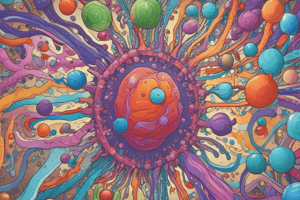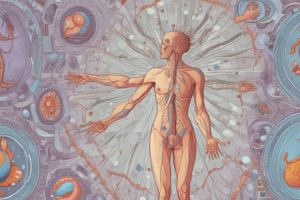Podcast
Questions and Answers
What is the study of the immune system called?
What is the study of the immune system called?
- Bacteriology
- Pathology
- Immunology (correct)
- Virology
Which type of immunity provides immediate, non-specific defense against infection?
Which type of immunity provides immediate, non-specific defense against infection?
- Active immunity
- Innate immunity (correct)
- Passive immunity
- Adaptive immunity
What is the function of neutrophils?
What is the function of neutrophils?
- Produce antibodies to fight infection
- Mature into macrophages
- Engulf and digest foreign particles and bacteria (correct)
- Recognize pathogens through pattern recognition receptors
What is the term for substances that trigger an immune response?
What is the term for substances that trigger an immune response?
What is the term for proteins produced by B cells to neutralize or remove pathogens?
What is the term for proteins produced by B cells to neutralize or remove pathogens?
What is the first step in the immune response?
What is the first step in the immune response?
What is the term for immune system disorders where the immune system mistakenly attacks healthy tissues?
What is the term for immune system disorders where the immune system mistakenly attacks healthy tissues?
What is the term for immune system disorders where the immune system is impaired, making the body more susceptible to infection?
What is the term for immune system disorders where the immune system is impaired, making the body more susceptible to infection?
What is the term for an overreaction of the immune system to harmless substances?
What is the term for an overreaction of the immune system to harmless substances?
What is the term for introducing a small, harmless piece of a pathogen to stimulate an immune response?
What is the term for introducing a small, harmless piece of a pathogen to stimulate an immune response?
Flashcards are hidden until you start studying
Study Notes
Overview of Immunology
- Immunology is the study of the immune system, which protects the body against disease-causing organisms and other foreign substances.
- The immune system consists of two main branches:
- Innate immunity: provides immediate, non-specific defense against infection.
- Adaptive immunity: provides long-term, specific defense against infection.
Key Cells and Molecules
- White blood cells (WBCs): defend the body against infection and disease.
- Neutrophils: engulf and digest foreign particles and bacteria.
- Lymphocytes: produce antibodies to fight infection.
- Monocytes: mature into macrophages, which engulf and digest foreign particles.
- Antigens: substances that trigger an immune response.
- Antibodies: proteins produced by B cells to neutralize or remove pathogens.
- Cytokines: signaling molecules that coordinate immune responses.
Immune Response
- Recognition: the immune system recognizes pathogens through pattern recognition receptors (PRRs).
- Activation: immune cells are activated to respond to pathogens.
- Elimination: the immune system eliminates the pathogen through various mechanisms (e.g., phagocytosis, antibody production).
- Memory: the immune system remembers specific pathogens, allowing for a more rapid response upon re-exposure.
Immune Disorders
- Immunodeficiency: the immune system is impaired, making the body more susceptible to infection (e.g., HIV/AIDS).
- Autoimmune disorders: the immune system mistakenly attacks healthy tissues (e.g., rheumatoid arthritis, lupus).
- Allergies: the immune system overreacts to harmless substances (e.g., pollen, peanuts).
- Transplant rejection: the immune system rejects transplanted organs or tissues.
Immunological Techniques
- Vaccination: introduces a small, harmless piece of a pathogen to stimulate an immune response, providing immunity.
- Immunotherapy: uses the immune system to fight disease (e.g., cancer, autoimmune disorders).
- Immunodiagnostic tests: detect and measure immune responses (e.g., ELISA, Western blot).
Overview of Immunology
- Immunology is the study of the immune system, which protects the body against disease-causing organisms and other foreign substances.
Immune System
- The immune system consists of two main branches:
- Innate immunity provides immediate, non-specific defense against infection.
- Adaptive immunity provides long-term, specific defense against infection.
Key Cells and Molecules
- White blood cells (WBCs) defend the body against infection and disease.
- Neutrophils engulf and digest foreign particles and bacteria.
- Lymphocytes produce antibodies to fight infection.
- Monocytes mature into macrophages, which engulf and digest foreign particles.
- Antigens are substances that trigger an immune response.
- Antibodies are proteins produced by B cells to neutralize or remove pathogens.
- Cytokines are signaling molecules that coordinate immune responses.
Immune Response
- The immune system recognizes pathogens through pattern recognition receptors (PRRs).
- Immune cells are activated to respond to pathogens.
- The immune system eliminates the pathogen through various mechanisms (e.g., phagocytosis, antibody production).
- The immune system remembers specific pathogens, allowing for a more rapid response upon re-exposure.
Immune Disorders
- Immunodeficiency occurs when the immune system is impaired, making the body more susceptible to infection (e.g., HIV/AIDS).
- Autoimmune disorders occur when the immune system mistakenly attacks healthy tissues (e.g., rheumatoid arthritis, lupus).
- Allergies occur when the immune system overreacts to harmless substances (e.g., pollen, peanuts).
- Transplant rejection occurs when the immune system rejects transplanted organs or tissues.
Immunological Techniques
- Vaccination introduces a small, harmless piece of a pathogen to stimulate an immune response, providing immunity.
- Immunotherapy uses the immune system to fight disease (e.g., cancer, autoimmune disorders).
- Immunodiagnostic tests detect and measure immune responses (e.g., ELISA, Western blot).
Studying That Suits You
Use AI to generate personalized quizzes and flashcards to suit your learning preferences.




